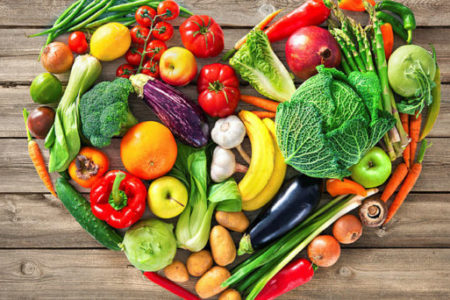Getting a Handle on High Blood Pressure (Hypertension)
There are many ways to naturally lower your blood pressure; here are some tips.
Dietary Changes that make a big difference are:
· Minimizing salt in the diet lowers blood pressure in most people and if you use salt, use a whole salt like sea salt or Himilayan salt. I use nutritional yeast flakes where people usually would use salt. Not only does it minimize salt intake, but, it has a nutty/salty flavour AND helps lower blood pressure because of the naturally occurring B vitamins.
· Vegetarian diets lower blood pressure partly because fruits and vegetables contain potassium—a blood pressure lowering mineral. The fibre provided by vegetarian diets may also help reduce high blood pressure. So try and include beans or legumes for meals instead of a meat protein for a change. For instance having black bean burritos with grated veggies and goat cheese for dinner one night, instead of a beef burrito; or stir-fried veggies with tofu/tempeh instead of chicken or a split pea soup instead of a pork wonton soup. I try and aim for at least 2 vegetarian meals per week.
· Substitute sugar and stimulants like coffee, tea (black, green or white), herba mate, rooibos or pop, since these are stimulants, therefore increasing cortisol levels,which increases blood pressure. Substitute sugar with maple syrup, agave syrup, coconut sugar, stevia or brown rice syrup. Limit stimulants to 2 or 3 cups per week.
· Increase garlic because it lowers blood pressure, so it’s a good idea to add it to food and/or take it as a supplement.
· Have food allergies tested, as they can contribute to hypertension in some people. If you suspect you may have a food allergy, have it tested by your local natural medicine doctor. You should know that skin prick tests are only about 20% accurate for food allergies, so, don’t waste your time doing that.
Lifestyle changes that are also helpful are:
· Quit smoking. Cigarettes have stimulants in them, so, is particularly bad for people with high blood pressure.
· Increase daily exercise. Exercise helps the body release stress and brings about a calming effect, so, lowering blood pressure significantly. 5 hours per week is now recommended to decrease blood pressure. Being overweight increased blood pressure, due to the extra work for the heart, therefore, exercise also helps weight loss by burning more calories.
· Minimize exposure to lead and other heavy metals. This has been linked to high blood pressure. Those suspecting heavy metal exposure should have a hair analysis done to make sure those levels are not too high. This shows accumulated levels, not just acute exposure.
· Increase regular stretching, yoga or meditation since they require the body to relax and focus, thus reducing cortisol and therefore blood pressure.
· Do Castor oil packs. Many of my patients LOVE doing castor oil packs. It gives them an excuse to relax, is soothing and helps you get to sleep and stay asleep. Consistent sleep reduces blood pressure. If you need instructions, go to my web-site at www.getbetterhealthonline.com
Nutritional supplements to consider:
· Many studies have found that calcium and magnesium supplements lower blood pressure. I recommend a 1:1 ratio of calcium/magnesium citrate or malate If you take them before bed, they also help you to sleep.
· Vitamin C (non-citrus base) has also been reported to lower blood pressure. I have people take Vitamin C to bowel tolerance (a little too much will give you gas, loose stools or for some pellet like stools, so, you increase by 1 capsule per day- our office 1200 mg/capsule or ¼ tsp, until you experience too much rumbling and then decrease it by 1 cap or ¼ tsp and that is what your body is using up on a regular basis). This support healthy blood pressure levels and reduces cortisol.
· Coenzyme Q10 is frequently deficient in people with hypertension and when supplemented blood pressure goes down significantly. Note many drugs prescribed to lower blood pressure and other heart medications deplete Co-Q 10.
· Omega-3 fatty acids, such as EPA and DHA in fish oil, also lowers blood pressure. It is best to use herring or sardine oil, since it is more concentrated and have 2EPA:1DHA. EPA reduces blood pressure more efficiently than DHA. Don’t be fooled by the total amount of fish oil, look for the total amount of EPA and DHA in the supplement.
Herbs that support healthy heart function and circulation:
· Garlic has a mild blood pressure lowering effect. Garlic’s positive effect on the heart includes reduction of platelet stickiness, so, is a great substitute for aspirin and has been shown to lower cholesterol and triglyceride levels.
· Hawthorn also exerts a mild blood pressure lowering effect and is a good anti-oxidant.
· Calming teas such as Tension Tamer, Chamomille, Sleepytime, Bedtime teas calm the nerves (they don’t make you tired), so, lowers blood pressure.
· Reishi, a type of mushroom, contains several constituents which lower blood pressure and Maitake mushroom has also been used to manage high blood pressure.
· Calming herbs, such as skullcap, oat straw, hops, chamomile and poppy ALL can be combined with spearmint or peppermint to make a pleasant blood pressure reducing tea that can you can drink anytime in any amount.
This should give you some useful ideas to help you lower your blood pressure.
If you would like specific tools to treat your high blood pressure consider an appointment with Dr. Brenda Gill at 250-362-5035.
References:
1. Stamler J, et al. Findings of the international cooperative INTERSALT study. Hypertension 1991;17(Suppl I):I-9-I-15.
2. MacGregor GA, et al. Double-blind study of three sodium intakes and long-term effects of sodium restriction in essential hypertension. Lancet 1989;ii:1244-7.
3. Margetts BM, et al. Vegetarian diet in mild hypertension: a randomised controlled trial. BMJ1986;293:1468-1471.
4. Cappuccio FP, MacGregor GA. Does potassium supplementation lower blood pressure? a meta-analysis of published trials. J Hypertens 1991;9:465-73.
5. Rossner S, Andersson I-L, Ryttig K. Effects of a dietary fibre-supplement to a weight reduction programme on blood pressure. Acta Med Scand 1988;223:353-7.
6. Rebello T, Hodges RE, Smith JL. Short-term effects of various sugars on antinatriuresis and blood pressure changes in normotensive young men. Am J Clin Nutr 1983;38(1):84-94.
7. Jeoung D-U, Dimsdale JE. The effects of caffeine on blood pressure in the work environment. Am J Hypertens 1990;3:749-53.
8. Potter JF, Beevers DG. Pressor effect of alcohol in hypertension. Lancet 1984;i:119-22.
9. Silagy CA, Neil HA. A Meta-analysis of the effect of garlic on blood pressure. J Hypertension 1994;12:463-8.
10. Grant ECG. Food Allergies and migraine. Lancet 1979;i:966-9.
11. Pirkle JL, Schwartz H, Landis JR, et al. The relationship between blood lead levels and blood pressure and its cardiovascular risk implications. Am J Epidemiol 1985;121(2):246-58.
12. Narkiewicz K, Maraglino G, Biasion T, et al. Interactive effect of cigarettes and coffee on daytime systolic blood pressure in patients with mild essential hypertension. J Hypertens 1995;13:965-70.
13. Kukkonen K, Rauramaa R, Voutilainene E, Lansimies E. Physical training of middle-aged men with borderline hypertension. Ann Clin Res 1982;14(Suppl 34):139-45.
14. Alderman MH. Nonpharmacologic approaches to the treatment of hypertension. Lancet 1994;334:307-11 [review].
15. Bucher HC, Cook RJ, Guyatt GH, et al. Effects of dietary calcium supplementation on blood pressure Ca meta-analysis of randomized controlled trials. JAMA 1996;275:1016-22.
16. Motoyama T, Sano H, Fukuzaki H, et al. Oral magnesium supplementation in patients with essential hypertension. Hypertension 1989;13:227-32.
17. Patki PS, Singh J, Gokhale SV, et al. Efficacy of potassium and magnesium in essential hypertension: a double-blind, placebo controlled, crossover study. BMJ 1990;301:521-3.
18. Dyckner T, Wester PO. Effect of magnesium on blood pressure. BMJ 1983;286:1847-9.
19. Trout DL. Vitamin C and cardiovascular risk factors. Am J Clin Nutr 1991;53(suppl):322S-5S.
20. Digiesi V, Cantini F, Bisi G, et al. Mechanism of action of coenzyme q10 in essential hypertension. Curr Ther Res 1992;51:668-72.
21. Morris MC, Sacks F, Rosner B. Does fish oil lower blood pressure? A meta-analysis of controlled trials. Circulation 1993;88:523-33.
22. Abe M, Shibata K, Matsuda T, Furukawa T. Inhibition of hypertension and salt intake by oral taurine treatment in hypertensive rats. Hyperten 1987;10:383-9.
23. Fujita T, Ando K, Noda H, et al. Effects of increased adrenomedullary activity and taurine in young patients with borderline hypertension. Circulation 1987;75:525-32.
24. Clarke JTR, Cullen-Dean G, Reglink E, et al. Increased incidence of epistaxis in adolescents with familial hypercholesterolemia treated with fish oil. J Pediatr 1990;116:139-41.
25. Silagy C, Neil AW. A meta-analysis of the effect of garlic on blood pressure. J Hypertens 1994; 12:463-8.
26. Blesken VR. Use of Crataegus in cardiology. Fortschr Med 1992; 15:290-2.
























